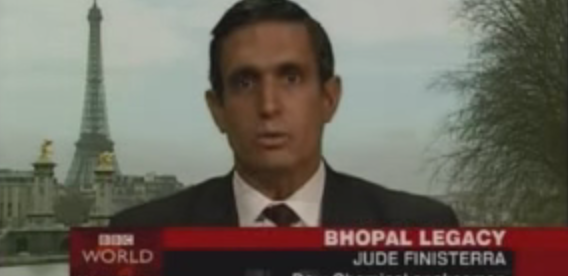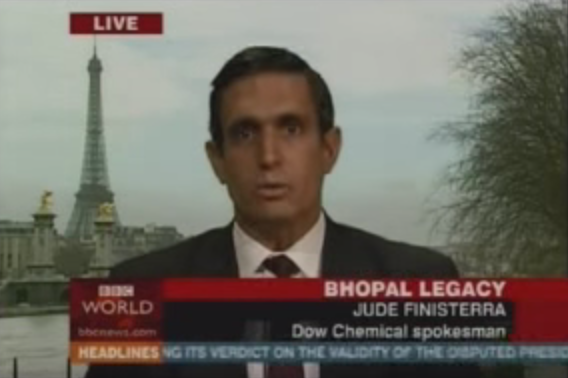The Real Effect of Fake News


On the evening of December 2, 1984, a chemical manufacturing plant in Bhopal, India owned by Union Carbide began leaking toxic gas into the surrounding areas. The resulting tragedy is generally considered one of the worst such disasters in history. At least 2,500 people died and by some estimates, the death toll was five times that. And that was just a glimpse into the damage. An estimated 550,000 people in the densely populated area were injured by the gas, with a quarter of them believed to have suffered serious, long-term medical issues, per Mother Jones. Environmental remediation is still on-going. The event is now called the “Bhopal Disaster,” but that name seems like an understatement.
For years afterward, India and Union Carbide locked horns in court, the former hoping to get the latter to pay for the damages. There were many rulings and agreements over the years as the two went back and forth. Even after the sides apparently settled, the administration of the dollars allocated to compensate victims was its own nightmare, and as a result, the Disaster remained in the news for years. In 2001, Dow Chemical acquired Union Carbide, acquiring the legacy of the Disaster with it. In 2004, the BBC, as part of its coverage of the 20th anniversary of the disaster, contacted Dow seeking a statement. The BBC came across what looked like Dow’s social responsibility website, DowEthics.com, which followed the design of the main Dow website at the time (available here). The man they were connected with was a Dow spokesperson named Jude Finisterra. Finisterra promised that he had big news to share.
Finisterra, as seen above, was put on air live via satellite (and the clip is available on YouTube now, here) to reveal his company’s surprise: Dow was going to put more money toward Bhopal relief. A lot more. “We have a $12 billion plan to finally, at long last, fully compensate the victims,” Finisterra told the BBC, “including the 120,000 who may need medical care for their entire lives; and to fully and swiftly remediate the Bhopal plant site.” And to fund this huge plan? Finisterra explained that “we [Dow] have resolved to liquidate Union Carbide — this nightmare for this world and this headache for Dow.” Dow had just promised to shutter a multi-billion company in a desire to make right the ills caused in the past.
The affected communities were overjoyed — but the stock markets were not. Shareholders were scrambling to react to an unprecedented act of corporate social responsibility but in their eyes, one which was irresponsible to the shareholders themselves. As CNN reported, “in Frankfurt, Dow’s share price fell 4.24 percent in 23 minutes, wiping $2 billion off its market value.”
But early sellers were about to be very disappointed, because the news was wrong. The BBC had fallen prey to a hoax. Jude Finisterra wasn’t a Dow spokesperson at all — in fact, he wasn’t even Jude Finisterra. He was a guy named Andy Bichlbaum, and he was part of an organization called the Yes Men — a group of activists pranksters who use guerrilla marketing tactics to advance an agenda of social change.
The Yes Men had set up the Dow Ethics website — it wasn’t an official Dow site at all. When the BBC contacted the people behind Dow Ethics, they had indadvertedly fallen into the Yes Men’s trap. And Dow’s stock price were the victims.
The BBC, after realizing the error, issued a full and unequivocal apology and retraction. The news hit the markets before the New York Stock Exchange opened the next morning; Dow’s stock on the exchange was unaffected by the ruse.
 Bonus Fact: This isn’t the only example of the BBC interviewing the wrong guy. In 2006, they interviewed the wrong guy named Guy, even. The BBC booked tech journalist named Guy Kewney to discuss a court case involving Apple and when he arrived, was to be rushed him onto the studio floor. Unfortunately, a guy named Guy Goma arrived at roughly the same time — he was there as an applicant for an IT support job. The wrong Guy was selected to go on air, leading to a very awkward interview, seen here, but ultimately a harmless one. Despite the mix-up, Guy Goma was not hired for the IT job.
Bonus Fact: This isn’t the only example of the BBC interviewing the wrong guy. In 2006, they interviewed the wrong guy named Guy, even. The BBC booked tech journalist named Guy Kewney to discuss a court case involving Apple and when he arrived, was to be rushed him onto the studio floor. Unfortunately, a guy named Guy Goma arrived at roughly the same time — he was there as an applicant for an IT support job. The wrong Guy was selected to go on air, leading to a very awkward interview, seen here, but ultimately a harmless one. Despite the mix-up, Guy Goma was not hired for the IT job.
From the Archives: The Most Isolated People in the World: A group of people who live on a small island near India and don’t take kindly to visitors — they even fire arrows at helicopters which fly by.
Take the Quiz!: Can you name the compounds when given their chemical formulas?
Related: “Five Past Midnight in Bhopal: The Epic Story of the World’s Deadliest Industrial Disaster” by Dominique Lapierre and Javier Moro. 4.0 stars on 19 reviews.
